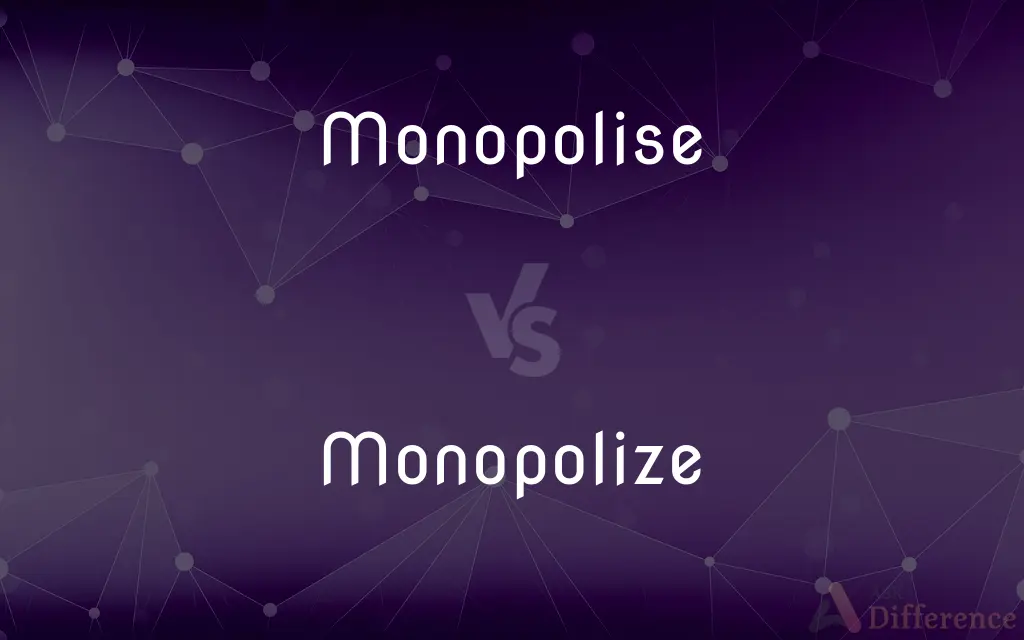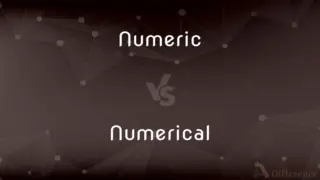Monopolise vs. Monopolize — What's the Difference?
By Fiza Rafique & Maham Liaqat — Updated on April 22, 2024
Monopolise and monopolize are two spellings of the same verb, primarily differing in usage: "monopolise" is common in British English, while "monopolize" is used in American English.

Difference Between Monopolise and Monopolize
Table of Contents
ADVERTISEMENT
Key Differences
Monopolise is the spelling predominantly used in British English, reflecting the typical British preference for "-ise" endings in words like organise and realise. On the other hand, monopolize is the preferred form in American English, aligning with the American usage of "-ize" endings in similar verbs such as organize and realize.
In academic and professional writing within the UK and Commonwealth countries, monopolise is the standard form, ensuring consistency with other British English conventions. Whereas in the United States, monopolize is consistently used, matching the orthographic style of American publications and institutions.
The choice between monopolise and monopolize can also influence the perception of text's formality and origin. While monopolise might appear more traditional or formal to some British readers, monopolize is often perceived as the more internationally recognized form due to American media's global influence.
Educational systems in the UK teach the "-ise" spelling as correct, embedding this preference from an early age. On the other hand, American schools teach the "-ize" spelling, reinforcing this as the standard American English form.
While both spellings are accepted by many international English dictionaries, they often list "monopolize" as the primary entry, with "monopolise" as a variant, reflecting the global dominance of American English. In contrast, British dictionaries like the Oxford English Dictionary may list "monopolise" first, followed by "monopolize" as the American variant.
ADVERTISEMENT
Comparison Chart
Spelling
Monopolise
Monopolize
Usage
Preferred in British English
Preferred in American English
Pronunciation
/ˈmɒnəpəlaɪz/
/ˈmɑːnəpəˌlaɪz/
Global Influence
Less globally dominant
More globally dominant
Educational Norm
Taught in UK and Commonwealth
Taught in US
Compare with Definitions
Monopolise
To dominate or hoard something to oneself.
He tends to monopolise the conversation during meetings.
Monopolize
To use something to one's exclusive advantage.
The team monopolized the available resources for their benefit.
Monopolise
To use something to one's exclusive advantage.
She monopolised the equipment for her project.
Monopolize
To obtain exclusive possession or control.
Their goal was to monopolize key technologies.
Monopolise
To eliminate or exclude competition.
Their strategy was clearly aimed to monopolise the market.
Monopolize
To have complete control over a commodity or service in a particular market.
This firm has managed to monopolize the software market in several countries.
Monopolise
To have complete control over a commodity or service in a particular market.
Several tech giants effectively monopolise the search engine market.
Monopolize
To eliminate or exclude competition.
The merger was criticized as a move to monopolize the industry.
Monopolise
To obtain exclusive possession or control.
The company aimed to monopolise the burgeoning industry.
Monopolize
To dominate or hoard something to oneself.
During debates, he always tries to monopolize the discussion.
Monopolise
Alternative spelling of monopolize
Monopolize
(of an organization or group) obtain exclusive possession or control of (a trade, commodity, or service)
They instituted press censorship and monopolized the means of communication
Monopolise
Have and control fully and exclusively;
He monopolizes the laser printer
Monopolize
To acquire or maintain a monopoly of.
Monopolise
Have or exploit a monopoly of;
OPEC wants to monopolize oil
Monopolize
To dominate or use to the exclusion of others
Monopolized the conversation.
Monopolize
(transitive) To have a monopoly on something.
Monopolize
(transitive) To dominate or to get total control of something by excluding everyone else.
Teachers try not to let any one student monopolize a class discussion.
Monopolize
To acquire a monopoly of; to have or get the exclusive privilege or means of dealing in, or the exclusive possession of; to engross the whole of; as, to monopolize the coffee trade; to monopolize land.
Monopolize
Have and control fully and exclusively;
He monopolizes the laser printer
Monopolize
Have or exploit a monopoly of;
OPEC wants to monopolize oil
Common Curiosities
Does the meaning of monopolise and monopolize change depending on the spelling?
No, both spellings convey the same meanings and are used in the same contexts, differing only in regional spelling preferences.
What is the main difference between monopolise and monopolize?
The main difference is spelling and regional usage; "monopolise" is British English, while "monopolize" is American English.
Can I use monopolise in American English?
While it's understood, "monopolize" is the standard spelling in American English.
Is monopolise incorrect in academic writing?
Monopolise is not incorrect in academic writing, especially within the UK or countries using British English standards.
How do publishers handle the spelling of monopolise/monopolize?
Publishers generally adhere to the regional spelling norms of their primary audience.
Why do British English and American English use different spellings?
The differences stem from historical preferences and standardizations in each variant of the language.
Are there other words similar to monopolise/monopolize in terms of regional spelling differences?
Yes, words like organise/organize, realise/realize, and analyse/analyze have similar regional spelling variations.
Can software detect the use of monopolise vs. monopolize?
Yes, most spell-check software can be set to either British or American English, detecting the use of either form based on settings.
Is it acceptable to use both forms in one document?
It's best to maintain consistency in spelling throughout a document to avoid confusion and maintain professionalism.
Do English learners need to understand both spellings?
Yes, understanding both spellings can be beneficial, especially for learners in a global context or those exposed to both forms of English.
Share Your Discovery

Previous Comparison
Numeric vs. Numerical
Next Comparison
Loathe vs. DetestAuthor Spotlight
Written by
Fiza RafiqueFiza Rafique is a skilled content writer at AskDifference.com, where she meticulously refines and enhances written pieces. Drawing from her vast editorial expertise, Fiza ensures clarity, accuracy, and precision in every article. Passionate about language, she continually seeks to elevate the quality of content for readers worldwide.
Co-written by
Maham Liaqat













































